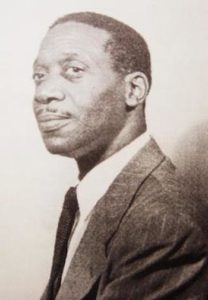
Harry Haywood, 1948
*Harry Haywood was born on this date in 1898. He was a Black labor activist, author, and communist sympathizer.
He was born Haywood Hall, Jr., in South Omaha, Nebraska, to former slaves Harriet and Haywood Hall, from Missouri and West Tennessee, respectively. They had migrated to Omaha because of jobs with the railroads and meatpacking industry, as did numerous other southern blacks. South Omaha also attracted White immigrants, and ethnic Irish had established an early neighborhood there. Haywood was the youngest of three sons. In 1913, after whites attacked their father, the Hall family moved to Minneapolis, Minnesota.
Two years later, in 1915, they moved to Chicago. During World War I, he served with the Eighth Regiment, a black United States regiment. Upon his return to Chicago, the younger Hall was radicalized by the bitter Red Summer of 1919, especially the Chicago race riot, in which primarily ethnic Irish attacked blacks on the South Side. Hall was influenced by his older brother Otto, who joined the Communist Party in 1921 and invited him to enter the secret African Blood Brotherhood.
As a teen, he was also influenced by theories he read in Vladimir Lenin's State and Revolution. During his four-and-half-year stay in the Soviet Union (1925–30), Harry Haywood held dual membership in the CPUSA and the CPSU. As a member of the CPSU, he traveled extensively in the Soviet Union's autonomous republics. He participated in the struggles against the Left Opposition headed by Leon Trotsky and the Right Opposition led by Nikolai Bukharin. In these struggles and others, Haywood was on the side of Joseph Stalin.
With the Comintern, Haywood was assigned to work with the newly created Negro Commission. In his major work Negro Liberation, he argued that the root of the oppression of Blacks was the unsolved agrarian question in the South. He believed that the unfinished bourgeois-democratic revolution of Reconstruction had been betrayed in the Hayes-Tilden Compromise of 1877. It abandoned African Americans to plantations as tenant farmers and sharecroppers, faced with Redeemer governments, the system of Jim Crow laws, and the terror of the Ku Klux Klan and other paramilitary groups. According to Haywood, the rise of imperialism left blacks frozen as "landless, semi-slaves in the South."
In 1920, Haywood married Hazel, but they separated the same year. He was a leading figure in the Communist Party of the United States (CPUSA) and the Communist Party of the Soviet Union (CPSU). His goal was to connect the political philosophy of the Communist Party with the issues of race. In 1926, he joined other African American Communists and traveled to the Soviet Union to study the effect of Communism on racial issues found in the United States. His work there resulted in his selection as the head of the Communist Party's Negro Department. The party platform changed by the late 1930s and began to stray from advocating for African American self-determination. As the party's platform changed over time, Haywood lost his stance within the party. He also created a group to help the Scottsboro boys’ case.
Haywood was also an author. His first book was Negro Liberation, published in 1948. While he was in Los Angeles in the late 1930s or 1940, he married Belle Lewis, whom he had known for years. They divorced in 1955. In 1956, Haywood married Gwendolyn Midlo, a New Orleans, Louisiana white activist. She has been active in civil rights throughout her life. She also has become a prominent historian of slavery in the United States, Latin America, and the African diaspora. She made her academic career at Rutgers University. They had three children and remained married until Harry Haywood’s death on January 4, 1985. He contributed major theory to Marxist thinking on the national question of African Americans in the United States. He was also a founder of the Maoist New Communist movement. He was buried in Arlington National Cemetery in Arlington, Virginia.
The Harry Haywood papers are housed at the Bentley Historical Library, University of Michigan, Ann Arbor, Michigan, and at the Manuscript, Archives, and Rare Books Division, Schomburg Center for Research in Black Culture, New York Public Library, New York City; this includes his autobiography called Black Bolshevik, which was published in 1978. In Richard Wright's autobiographical novel Black Boy (American Hunger), the character of Buddy Nealson is said to represent Harry Haywood.